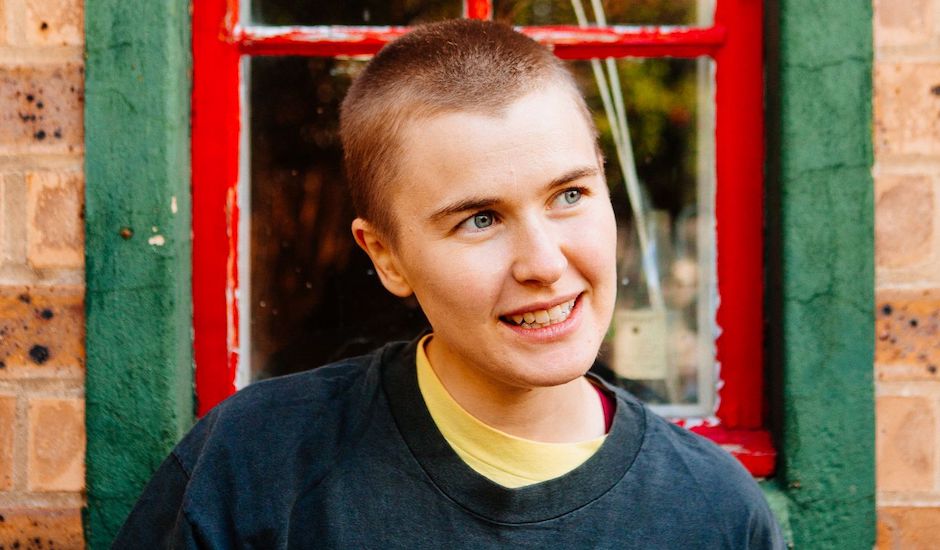 Premiere: ELEEA debuts a powerful new video for her latest single, SpaceThe Indigenous musician takes a trip into the outback for the sun-lit new video.
Premiere: ELEEA debuts a powerful new video for her latest single, SpaceThe Indigenous musician takes a trip into the outback for the sun-lit new video.

The Theory of Absolutely Nothing, and Alex The Astronaut’s heartbreaking beauty
On her debut album, Alex The Astronaut proves her ability in stomping all over your emotions - even when she’s singing upliftingly.
Content Warning: This article discusses domestic violence. If you or someone you know is impacted by sexual assault, domestic or family violence call 1800RESPECT on 1800 737 732 or visit 1800RESPECT.org.au. If you need support, call Lifeline on 13 11 14. In an emergency, call 000.
Header image by Jess Gleeson.
Alex The Astronaut’s music was an unexpected saviour during the 2017 Australian Marriage Law Survey. As Australia argued about the rights of queer Australians, many of them - myself included - felt the need to hide; forced backwards to avoid potential confrontation in a time where even the most bigoted conversations were labelled “a good argument,” because it’s always worth “hearing both sides.” Not Worth Hiding, a single Alex The Astronaut released just a month prior to the plebiscite’s beginning, encouraged strength and perseverance. It felt like a friend reaching out, telling you that they understand and that eventually, you’ll be able to step forward once again.
As you’d expect, it was a song that soundtracked the lives of many queer Australians during this time. It was a song that could strengthen you, while simultaneously allow you to wallow in the circumstances if need be. It was cathartic, and especially so for Alex The Astronaut.
Up until this point, the Sydney musician was a darling of Australia’s indie-pop scene that was teetering on the edge of something special. Her music was always rooted in intimate and personal lyricism, breaking down the complexities of the multi-faceted artist behind the music, but Not Worth Hiding very much felt like something else, like the beginnings of a trajectory that would eventually label Alex as one of the country’s most important and therapeutic songwriters - even in the context outside of the same-sex marriage plebiscite.
In everything she’s done since, this catharticism has been at the forefront of her work, regardless of whether it’s internal catharticism - i.e. Alex The Astronaut processing experiences through songwriting, and growing internally in the process of doing so - or external, from those that grapple onto her music - happy, sad, angry, romanticised or whatever else - and use it as an avenue to channel their own emotions. Alex The Astronaut’s music is incredibly unique in the way that gives the option for both; her music not just being a reflection of the artist’s constant interpersonal transformations, but also providing the platform and soundtrack for other people to have their own realisations too.
Last Friday came The Theory of Absolutely Nothing, Alex The Astronaut’s debut album and one that really emphasises the musician’s wonder in her work; amplifying the aforementioned qualities of her music which makes it such as an emotionally thrilling listen. It’s 11 tracks - 10, if you don’t count a short, 18-second outro - that really bare everything, giving an opportunity not just for Alex The Astronaut to free herself and step further into the limelight through doing so, but also an opportunity for others to grapple in her stories, and find themselves in the same way Alex no doubt did the same.
This sense of therapy - for both Alex looking out, and everyone else looking in - is core to The Theory of Absolutely Nothing’s beauty. Happy Song depicts a relationship’s eventual end in a way that the song immediately following, Lost, captures the rush of trying to fix everything before it all goes down the drain, and the confused feeling that comes when you know that you’ve explored every possible avenue to get things back on track. I Didn’t Know - which in many ways, is kind of the prequel to Happy Song - brings the anger and passion of an ending relationship’s arguments, while Banksia dives into loss, and the strange sense of questioning that surrounds an acquaintance’s passing: “Should I have reached out?”
They’re all tracks on the sombre side of Alex The Astronaut’s songwriting, songs that really capture the emotional intensity of processing through music, and the intelligence that goes into being able to do so. They’re underpinned by solemness, but in a kind-of comforting way that makes you feel less alone for feeling the same way; Alex The Astronaut’s tendency to focus on exact feelings associated with themes such as loss and heartbreak - rather than the over-generalising it - giving her work this unique sense of familiarity that makes it a touch more potent, and relatable in doing so.
Even her more uplifting work - of which there’s plenty on The Theory of Absolutely Nothing, it’s not a depressing record per se - carries this sense of familiarity, the one that allows you to feel ‘seen’ by her work. San Francisco gives one example, being Alex The Astronaut dreaming of escapism, and transporting yourself to a place you’ve never been much in the same way you dream of a trip to Fiji, even if your budget doesn’t even allow the Gold Coast. Christmas In July is another example, depicting the gratefulness and luckiness of having someone new enter your life, and how everything doesn’t quite feel real for a short moment of a time - like a kid waking up on Christmas morning.
However, The Theory of Absolutely Nothing’s most touching - and crucially important - moment comes in the form of I Like To Dance. It’s an opportunity for Alex The Astronaut to grow and for the rest of us to grow alongside her; a moment of education that sees her reach out to domestic violence liaison officers and workers, learn from their observations over the years, and use it as an opportunity to amplify stories amongst Australia’s most important. It’s firm in the seriousness of domestic violence and doesn’t attempt to charade it through metaphors or anything of that ilk, instead keeping it front and centre, unavoidable to those who wish to look the other way.
It’s similar to Not Worth Hiding - a song that really encapsulates Alex The Astronaut’s craft - in that it doesn’t so much encourage you to pay attention as it does demand it. When you listen to one of her songs, you can’t avoid what you’re listening to. The way Alex tells her stories makes them as potent as they can be; both literally through lyricism, and in the way her work can evoke the same depth of emotion she must find while writing it herself.
You can’t help but pay attention to what Alex The Astronaut has to say, and in turn, you come away from the record not just most knowledgable on the musician’s complexities and experiences generally-speaking, but most likely of your own too. If that’s something she’s become known for, then The Theory of Absolutely Nothing is it being engraved into concrete, for the world to take notice of for as long as it exists.
Follow Alex The Astronaut: FACEBOOK
 Premiere: ELEEA debuts a powerful new video for her latest single, SpaceThe Indigenous musician takes a trip into the outback for the sun-lit new video.
Premiere: ELEEA debuts a powerful new video for her latest single, SpaceThe Indigenous musician takes a trip into the outback for the sun-lit new video.
 Premiere: Sly Withers hit a new peak with returning single / video, CracksDespite the national celebrations of their 2019 Gravis EP - including a Splendour appearance - being put on hold, the Perth group are looking forward.
Premiere: Sly Withers hit a new peak with returning single / video, CracksDespite the national celebrations of their 2019 Gravis EP - including a Splendour appearance - being put on hold, the Perth group are looking forward.